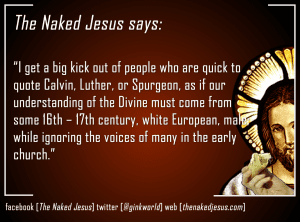
I get a big kick out of people who are quick to quote Calvin, Luther, or Spurgeon, as if our understanding of the Divine must come from some 16th – 17th century, white European, male; while ignoring the voices of many in the early church. Most of those people ignore the 1st – 2nd century Middle-Eastern voice, people like Ignatius [68-107], Papias [110-130], Melito [about 180], Titian [around 185], Origen [185-254], and Athenagoras [about 190], to name a few [Unfortunately, none of those listed are females. We need more scholarly work to identify female theologians in the early church]. Whenever I’m in dialog with many of my Neo-Calvinist friends, it’s only a matter of time before one of them quotes Calvin, Spurgeon, Luther, or some other long dead European, as if they were the final authority of what we are discussing. Whenever that happens, I’m quick to remind them that, ‘Just because [Insert Name] said it, doesn’t make it right,’ which doesn’t sit well with them. When we think in terms of the Collective Narrative, we must remember, everyone was from the Middle-East. When we think of first century authors, we need to remember they’re all Middle-Eastern. We need to remember that a theology developed within a 16th – 17th century European mindset, or culture, is vastly different than a theology understood by a 1st century Middle-Eastern Jews. For example, most scholars generally recognized that the penal substitution theory was not taught by the Early Church. In fact, the accepted view of the early church was either the ransom theory of atonement, or the moral influence theory of atonement.
Given that, I’m not a big supporter of Penal Substitution theory. To me, what grows from this theory is a judgmental, wrathful, mean-spirited God, which causes us to develop the same relationship with others. This theory causes more questions than answers:
- Is the Divine’s wrath, and desire for justice, bigger then the Divine’s grace?
- If wrath, and judgment, are bigger then the Divine’s grace, does one have to redefine grace to fit the model?
- Does the Divine punish others for the sins of others?
- Does the idea that the Divine’s wrathful open our hearts to the love of the Divine?
- When we think in terms of wrath, and judgement, does it open our hearts to loving our neighbor?
- Does fear motivate us to love, or to live in fear?
- If we see the Divine as wrathful, and judgmental, can we trust in the idea of salvation?
- Does seeing the Divine as wrathful, and judgmental, move us to living a holy life?
To understand what I’m talking about, let me share the definition of Penal Substitution theory, as I see it, and give a brief, very brief, explanation of how it came about. Penal Substitution center on the fact that Christ must be punished [penal], by his own choice, for the sinners [substitute], to satisfy the demands of an angry, wrathful god, so this god can forgive [pay the price] our sins. While this idea flies in the face of so many points in the Collective Narrative [one of the big ones is that you cannot inherit the sins of others], it’s one that took hold during the Reformation under Calvin, and Luther, why? Let’s look at how first.
So, how did this happen? Sometime between 1094-1098 this guy, Anselm of Canterbury [a Benedictine Monk who later became the Archbishop of Canterbury], wrote a little thing called “Cur Deus Homo?” [Why God became Man?]. The Cur Deus Homo? was a dialog between Anselm, and one of his students, Boso.
To understand Anselm’s ideas, one needs to grasp the Wergild, the Medieval Common Law developed out of Germanic Tribal Law. Anselm sought to understand the nature of the Divine based on the traditions of Germanic Tribal Customs. His argument centers completely on Medieval Common Law; on what can be seen as Medieval European Realism, the feudal relationship between a Slave and a Lord. The problem was, Anselm didn’t start with the Collective Narrative, he started with German Common law. Finding support in the Collective Narrative came later while Calvin was trying to refine the theory, which any good Calvinist will tell you is not the way to go about it [oh, how ironic]. Calvin did what many Neo-Calvinist claim others do, he started with an idea [twisted as it is] and based his ideas on culture, and not the Collective Narrative to make their point. The problem all this causes is that Neo-Calvinists spend too much time centering on how the theory works, and very little – if any – on the end results [we are all forgiven]
This now brings me to the why. For me, and my experience with Neo-Calvinists, I can only see one reason why; control of others. When the Divine is seen as wrathful, judgmental, one must depend on the ideas, and views, of the Clergy to insure they are following the rules the right way – and, if I’m not mistaken, Jesus had something to say about that.












